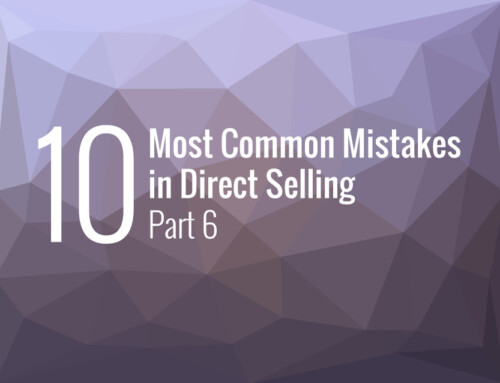Affiliate is a buzzword floating around the Direct Selling or Multi-level Marketing (MLM) Industry. New and existing companies are incorporating this into their business model, but there are some things to consider so you can determine if this is a good fit for you.
Most Direct Selling and MLM Compensation Plans already have one or more bonuses that reward distributors for selling to customers, which is what being an affiliate is all about. Some companies are adjusting their marketing strategy to highlight their compensation plan’s “affiliate” aspect rather than creating a separate program. Others are choosing to differentiate between distributor and affiliate through different enrollment options and bonuses.
The Difference between Distributor and Affiliate
Typical Direct Selling and MLM Distributors sign up to sell a company’s products and may earn commissions on their sales to customers and on the sales made by their downline. Most distributors do not sponsor other distributors, but those that do have a responsibility to train and work with those individuals.
On the other hand, affiliates promote a company’s products to earn a commission on the sales they generate. They have less responsibility and commitment than distributors, as the affiliates only make a commission on their customer sales without having to manage a downline. It’s considered a more passive engagement.
A few companies allow affiliates to enroll other affiliates or distributors and earn a small commission on those sales. However, most affiliate programs solely focus on selling to customers and only allow affiliates to build a team if they upgrade to a distributor.
The Purpose of an Affiliate Program
The general purpose of an affiliate program is to increase sales. However, there are several aspects worth considering:
- Increase sales with a broader reach: An affiliate program can help companies expand their reach and customer base. Some of those affiliates would never have joined if being a distributor was the only option to earn money.
- Low-pressure entry: The affiliate program can be a great introduction to the business, products, and opportunity to make money without the negative perception and pressure often associated with being a distributor. Companies are seeing some affiliates upgrade to a distributor after they have experienced success and begin to see the more significant opportunity available to distributors.
- Brand Awareness: Building brand awareness is critical to surviving in today’s marketplace. Affiliate programs can help companies build brand awareness without the typical negative associations of being a Direct Selling / MLM company.
- Defined roles: It can often be difficult for distributors to identify whom they should work with. By offering different enrollment options for distributors and affiliates, distributors may spend their time more effectively with the right people.
Elements of an Affiliate Program
An effective affiliate program should have several key elements, including:
- Competitive commission structure: The commission structure should be clear, transparent, and competitive. Some programs have one percentage that is paid regardless of sales amounts, and other programs give higher rates for affiliates that achieve higher monthly sales. The typical range that we see is between 10-35%. The tables below are examples of sales commission structures available to affiliates and how that might relate to the sales commission structure available to distributors.
- Marketing materials and training: Many affiliates are not “influencers” and are not accustomed to creating their own content. They may not even know how best to share your products and links. Providing affiliates with training and a range of marketing materials, such as product descriptions, images, and promotional codes, can help them effectively promote your products.
- Tracking and reporting: Real-time tracking and reporting allow an affiliate to see how many sales they have generated and how much commission they have earned. This can motivate them to continue sharing products.
- Frequent payments: Many affiliate programs pay weekly; some even pay daily or in real time. Paying more frequently than monthly can help keep motivation high. Some programs pay a base amount frequently and then pay any additional amount earned through higher sales at the end of the month.
- No or low entry cost: Affiliates are not accustomed to having to pay a company to sell their products. Many see a typical distributor enrollment fee as a deal breaker and will not join. Because of this, many affiliate programs have no cost or a very low cost to becoming an affiliate.
Risks and Additional Considerations
Including an affiliate program in a compensation plan has many benefits, but some risks and other points also need to be considered.
- Perceived competition: Distributors may see the affiliate program as competing with their business. They must understand how the program benefits them and will be incorporated into their business. Additionally, distributors should have access to opportunities that affiliates have, such as promo codes and the same (or higher) commission on customer sales.
- Customers enrolling as affiliates: Because the cost to become an affiliate is often free or very low, there is a risk that customers will enroll as an affiliate to get a discount on their purchases. This can reduce distributors’ earnings because they typically receive a higher percentage on their customers’ sales compared to what they earn on their team sales (which is what they would make on the sales from the affiliate). A policy to convert an affiliate to a customer for inactivity can help minimize this, but it’s something to monitor regularly. It is also vital to ensure that the affiliate program is marketed as an opportunity to earn money, not to get a discount.
- Compensation Plan: Not all compensation plans are set up to integrate an affiliate program seamlessly. You may need to adjust the plan and policies to make that work. Bonuses, title qualifications, volumes, lineages, and policies must all be considered.
- Path to Distributorship: There should be a clear path for affiliates to upgrade to distributors without losing what they earn on their customers’ sales.
- Potential Distraction: Affiliate programs can distract your existing field. It may be the new shiny toy that everyone focuses on rather than what you want your distributors to focus on.
- Resource needs: Internal resources are also required to make an affiliate program work. An affiliate program will touch many different parts of your business, so it takes considerable planning and time to integrate it appropriately. Consider customer service, training, communications strategy, recognition, marketing, software, etc.
Conclusion
Affiliate programs can be a great asset to our industry, but they may not be a good fit for every company. If it’s something that you are interested in, take your time to research and plan appropriately so that your affiliate program will meet your goals.






